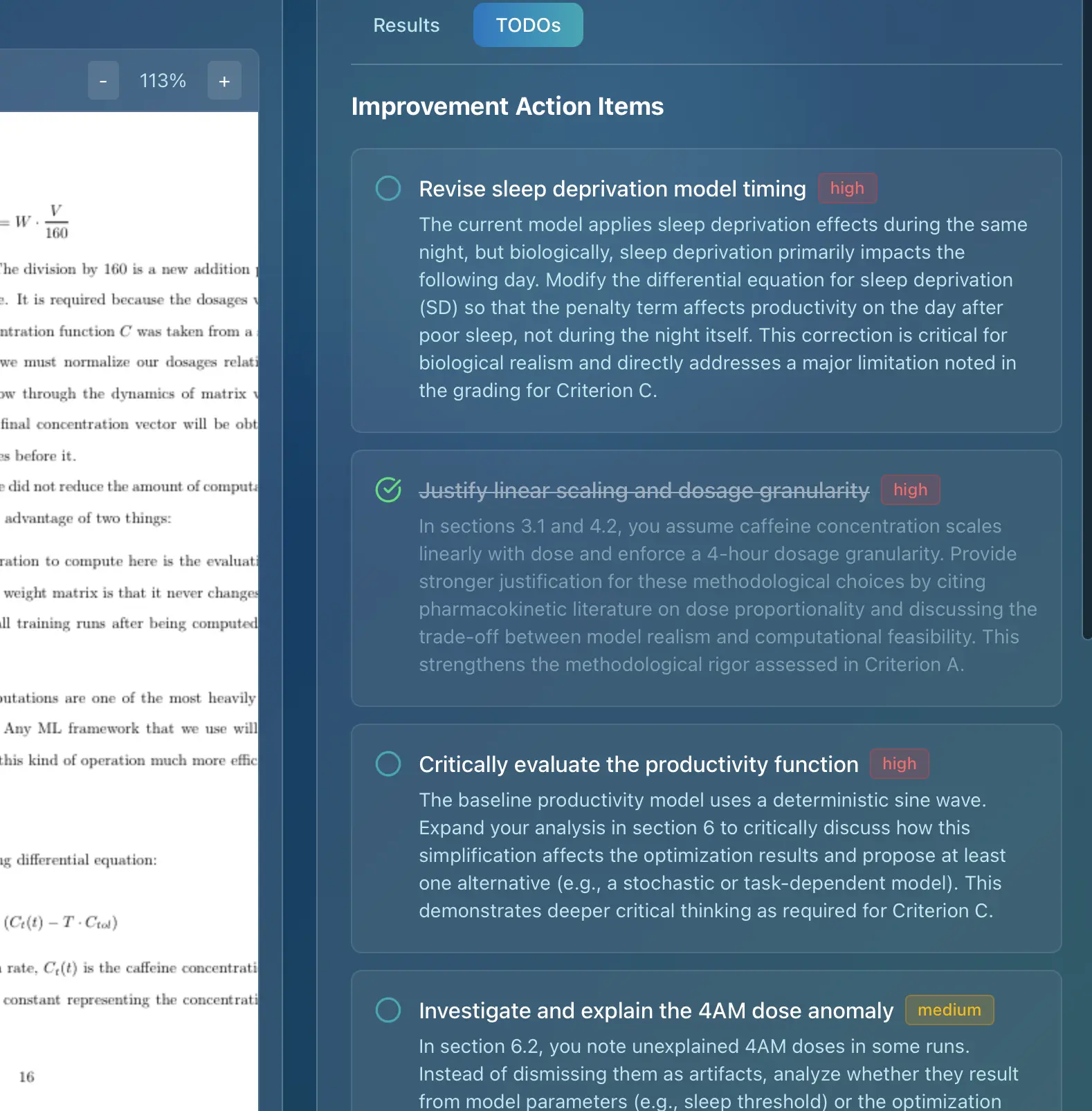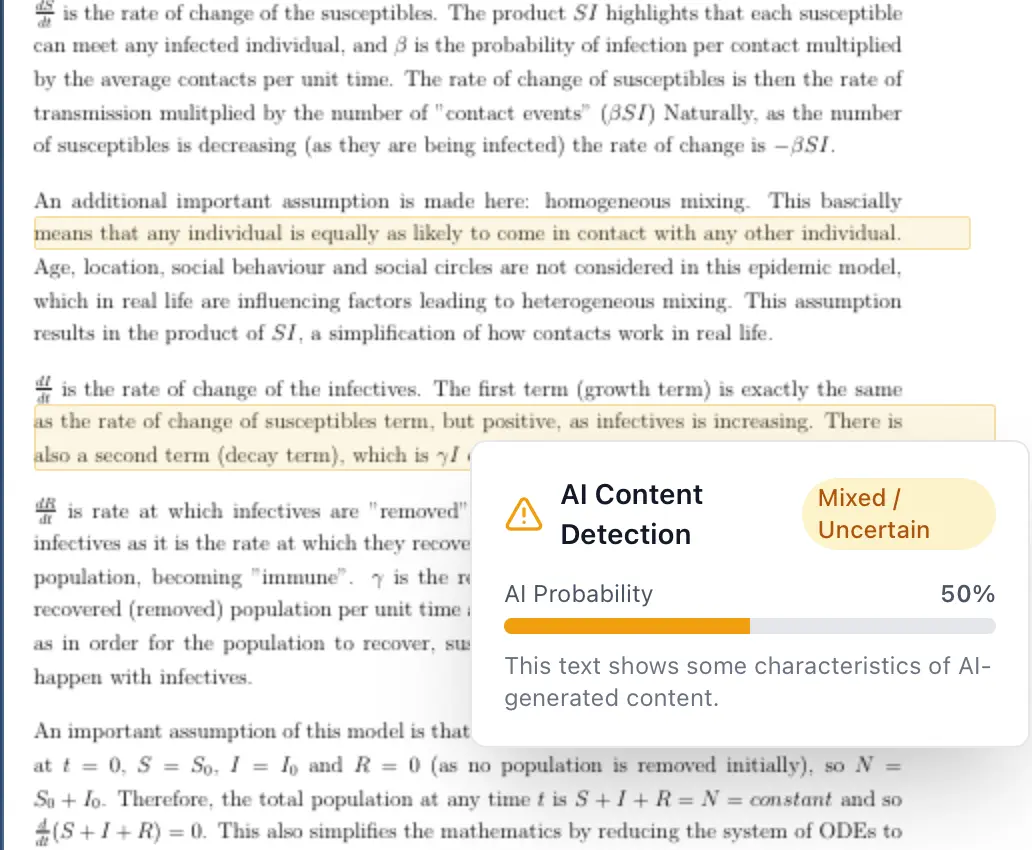How to Create the Perfect IB Study Group
Navigating the International Baccalaureate (IB) Diploma Programme can feel like climbing a mountain. But what if you didn't have to climb alone? Creating the perfect IB study group can be the key to unlocking higher scores, reducing stress, and truly understanding the complex concepts you'll encounter. This guide will walk you through every step, from finding the right members to implementing effective study strategies, ensuring your group becomes a powerful tool in your IB journey. We'll also explore how technology, including AI grading assistants, can further enhance your group's effectiveness. So, if you're looking for a comprehensive guide to mastering the IB through collaborative learning, you've come to the right place.
Why Form an IB Study Group? The Benefits Explained
The IB Diploma Programme is notoriously challenging, demanding a high level of critical thinking, independent research, and effective time management. A well-structured study group can provide invaluable support in several key areas:
- Shared Knowledge: Different students excel in different areas. A study group allows you to pool your knowledge and fill in any gaps in your understanding.
- Motivation and Accountability: Knowing that you have a scheduled meeting with your group can be a powerful motivator. You're more likely to stay on track with your studies when you're accountable to others.
- Diverse Perspectives: Discussing concepts with peers exposes you to different viewpoints and approaches, leading to a deeper understanding of the material.
- Reduced Stress: Sharing the workload and supporting each other can significantly reduce the stress associated with the IB Diploma Programme.
- Exam Preparation: Practicing exam questions and reviewing past papers together can help you identify areas where you need to improve and build confidence for the real exam.
Struggling with IB Assessments?
Get instant, detailed feedback on your work with AI that understands IB criteria.

Step-by-Step Guide to Building Your Ideal IB Study Group
Forming a successful study group requires careful planning and execution. Here's a step-by-step guide to help you create the perfect group for your needs:
1. Define Your Goals and Objectives
Before you start recruiting members, take some time to define your goals and objectives. What do you hope to achieve through your study group? Are you focusing on a specific subject, like Chemistry or History? Are you aiming to improve your Internal Assessment (IA) scores? Clearly defining your goals will help you attract like-minded individuals and ensure that your group stays focused.
- Example: "Our goal is to achieve a 6 or 7 in IB Biology HL. We will focus on understanding key concepts, practicing past papers, and providing feedback on each other's IAs."
2. Recruit the Right Members
The success of your study group depends heavily on the quality of its members. Look for individuals who are:
- Committed: They are willing to dedicate time and effort to the group.
- Knowledgeable: They have a strong understanding of the subject matter.
- Collaborative: They are able to work effectively with others and contribute positively to the group dynamic.
- Reliable: They are punctual and follow through on their commitments.
Consider students with different strengths and weaknesses to create a well-rounded group. A mix of learning styles can also be beneficial. Aim for a group size of 3-5 members. This allows for diverse perspectives while ensuring that everyone has a chance to participate.
3. Establish Clear Ground Rules
To prevent conflicts and ensure that your group runs smoothly, establish clear ground rules from the outset. These rules should cover:
- Meeting Schedule: How often will you meet? What time and day?
- Meeting Location: Where will you meet? (In person or online?)
- Meeting Agenda: How will you structure your meetings?
- Communication Protocol: How will you communicate outside of meetings? (e.g., WhatsApp, email)
- Conflict Resolution: How will you handle disagreements or conflicts within the group?
- Attendance Policy: What happens if someone misses a meeting?
Document these rules in writing and ensure that everyone agrees to abide by them.
4. Structure Your Study Sessions
Effective study sessions require careful planning and structure. Here are some tips for maximizing your group's productivity:
- Create an Agenda: Before each meeting, create a detailed agenda outlining the topics you will cover and the activities you will undertake.
- Assign Roles: Assign different roles to group members, such as facilitator, note-taker, and timekeeper.
- Use a Variety of Activities: Incorporate a mix of activities into your study sessions, such as:
- Concept Review: Discuss key concepts and definitions.
- Problem Solving: Work through practice problems together.
- Past Paper Practice: Attempt past paper questions under exam conditions.
- Peer Teaching: Each member teaches a specific topic to the group.
- IA Feedback: Provide constructive feedback on each other's IAs.
- Take Breaks: Schedule regular breaks to prevent burnout and maintain focus.
5. Leverage Technology to Enhance Collaboration
Technology can be a powerful tool for enhancing collaboration within your study group. Consider using the following tools:
- Online Collaboration Platforms: Google Docs, Microsoft Teams, and Slack can facilitate communication, document sharing, and collaborative editing.
- Video Conferencing Tools: Zoom, Google Meet, and Skype allow you to conduct virtual study sessions.
- Online Whiteboards: Miro and Mural provide a virtual space for brainstorming and collaborative problem-solving.
- Flashcard Apps: Quizlet and Anki can help you create and share flashcards for memorizing key concepts.
Common Challenges and Mistakes in IB Study Groups
Even with careful planning, study groups can encounter challenges. Here are some common pitfalls to avoid:
- Dominating Personalities: One or two members may dominate the discussion, preventing others from contributing. To address this, encourage active listening and ensure that everyone has a chance to speak.
- Lack of Focus: The group may get sidetracked by irrelevant topics or social chatter. To maintain focus, stick to the agenda and set time limits for each activity.
- Unequal Contribution: Some members may not contribute as much as others. To address this, assign specific tasks to each member and hold them accountable for their contributions.
- Conflicting Schedules: It can be difficult to find a time that works for everyone. To minimize scheduling conflicts, be flexible and willing to compromise.
- Personality Clashes: Disagreements and personality clashes can disrupt the group dynamic. To resolve conflicts, encourage open communication and focus on finding common ground.
Pro Tip: Get AI-Powered Grading
Stop second-guessing your grades. Get instant feedback aligned with official IB rubrics.

Advanced Tips and Strategies for IB Study Group Success
Once you've established a solid foundation, you can take your study group to the next level with these advanced tips and strategies:
- Focus on Understanding, Not Just Memorization: Don't just memorize facts and formulas. Strive to understand the underlying concepts and principles.
- Connect Concepts Across Subjects: Look for connections between different subjects to gain a more holistic understanding of the IB Diploma Programme.
- Practice Active Recall: Instead of passively rereading your notes, test yourself regularly to reinforce your learning.
- Seek Feedback from Teachers: Ask your teachers for feedback on your group's work and progress.
- Adapt Your Strategies: Be willing to adapt your strategies as needed based on your group's performance and feedback.
Technology and Modern Assessment: How AI Can Help
The landscape of education is constantly evolving, and technology is playing an increasingly important role in IB assessment. AI-powered tools are transforming the way teachers provide feedback and students improve their work.
Marksy is a leading AI grading assistant specifically designed for the International Baccalaureate. It provides instant, accurate, and detailed feedback on student work based on official IB rubrics. This means teachers can save valuable time while ensuring that students receive consistent and constructive feedback.
Here's how Marksy can benefit your IB study group:
- Rubric-Aligned Scoring: Marksy uses official IB rubrics to score student work, ensuring that feedback is aligned with the IB's assessment criteria.
- Detailed Criterion-by-Criterion Feedback: Marksy provides detailed feedback on each criterion, helping students understand exactly where they need to improve.
- Suggestions for Improvement: Marksy offers specific suggestions for improvement, guiding students on how to enhance their work.
- Consistent and Objective Assessment: AI ensures that all students are assessed fairly and consistently, eliminating potential bias.
By incorporating AI tools like Marksy into your study group, you can gain a deeper understanding of the IB assessment criteria and improve your overall performance. Imagine using Marksy to analyze practice IAs within your group, getting immediate feedback and identifying areas for improvement before submitting the final version. This allows for targeted revision and a much higher chance of achieving a top score.
Conclusion: Your Path to IB Success Starts Now
Creating the perfect IB study group is an investment in your academic success. By following the steps outlined in this guide, you can build a supportive and collaborative learning environment that will help you thrive in the IB Diploma Programme. Remember to define your goals, recruit the right members, establish clear ground rules, structure your study sessions, and leverage technology to enhance collaboration. Don't be afraid to adapt your strategies as needed and seek feedback from teachers. With dedication and teamwork, you can achieve your full potential and excel in your IB studies.
Ready to take your IB studies to the next level? Try Marksy for free today and experience the power of AI-driven assessment!